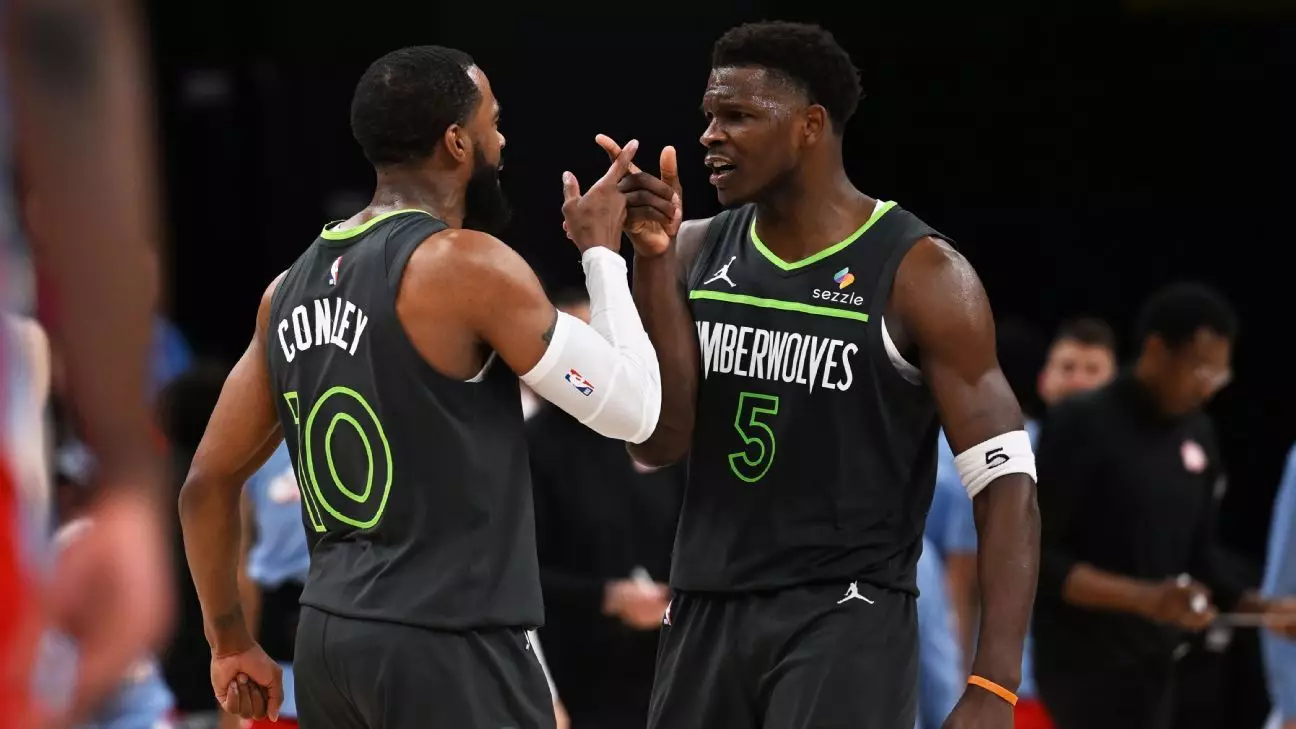In the high-stakes world of professional basketball, emotions run rampant. Players are put through a crucible of competitiveness, where every call can feel like a life-or-death decision for the team’s momentum and morale. This was poignantly illustrated in a recent episode surrounding Minnesota Timberwolves’ budding superstar, Anthony Edwards, whose fiery spirit on the court nearly led him to an unwanted suspension. The fact that the NBA later rescinded his technical foul, which was initially his 18th of the season, speaks not only to the severity of penalties within the league but also to how easily passion can be misinterpreted as insubordination.
In Edwards’ case, a minor offense—the use of profanity in reaction to an officiating decision—could have resulted in a one-game suspension, thus denying him an integral chance to support his team in the final game of the regular season against the Utah Jazz. With keen playoff aspirations, every game counts. The Timberwolves are caught in the thick of a playoff race, aiming for a pivotal seeding that could either see them secure home-court advantage or drop them into the grind of the play-in tournament. As they jostle for a favorable position against formidable Western Conference foes, the stakes have never been higher.
The Price of Conduct: Cultural Implications
Edwards is not an isolated case; he joins a larger fraternity of athletes who have faced severe penalties for what could be viewed as minor missteps. Across all sports, the focus on maintaining an image of decorum seems to come at the expense of genuine expression. The NBA is known for its strict regulation of player conduct, but one has to wonder: does this enforced politeness stifle the authentic passion that fans crave?
The $320,000 in fines that Edwards has racked up over various infractions is a steep price for merely expressing himself on the court. While I understand the need for maintaining a level of professionalism—after all, the integrity of the game must be preserved—there is also a plea for understanding the socio-cultural dynamics at play. An athlete’s emotional outburst after an unfair call should not be treated on par with flagrant misconduct. This scrutiny can become counterproductive, leading talented players into a state of self-censorship.
Decisions Beyond Just the Scoreboard
This dilemma extends beyond mere penalties; it has broader implications for how athletes interact with both the game and their fans. The decision to rescind Edwards’ technical foul can be seen as an acknowledgment by the NBA that sometimes the existing framework may not capture the nuances of the moment. Here lies the irony: a league that actively promotes player narratives and individuality also dictates the terms of their emotional responses. The fine line between individuality and compliance is as blurry as the definitions of foul and fair play.
Moreover, Timberwolves’ Coach Chris Finch’s comments about the lack of clarity surrounding the technical foul reflect a widespread issue: inconsistent officiating creates an environment of frustration and ambiguity. When the officials’ dictation of rules seems capricious or subjective, it can reverberate throughout a team, leading to higher tensions on and off the court. The inconsistency not only invites doubt among players but also erodes trust among fans who are left gasping for clarity in an already chaotic sport.
The challenge standing before the Timberwolves—and indeed before any NBA team—goes beyond simply winning or losing; it is a matter of forging a culture that balances emotional authenticity with respect for the game. Coaches, players, and referees must all engage in mutual understanding. As Edwards himself stated, he cherishes his relationship with official Ray Acosta and hopes that will lead to grown understanding in the heat of the moment. Is there not a strong case for evolving the policies surrounding technical fouls, allowing for more leniency when the passion of the game manifests itself on the court?
The quest for a championship run is rife with obstacles, but one can only hope that a powerful game in the Timberwolves’ hands will not be overshadowed by an individual’s momentary lapse, particularly when that lapse is an expression of the very essence that makes sports so thrilling to watch.


Leave a Reply